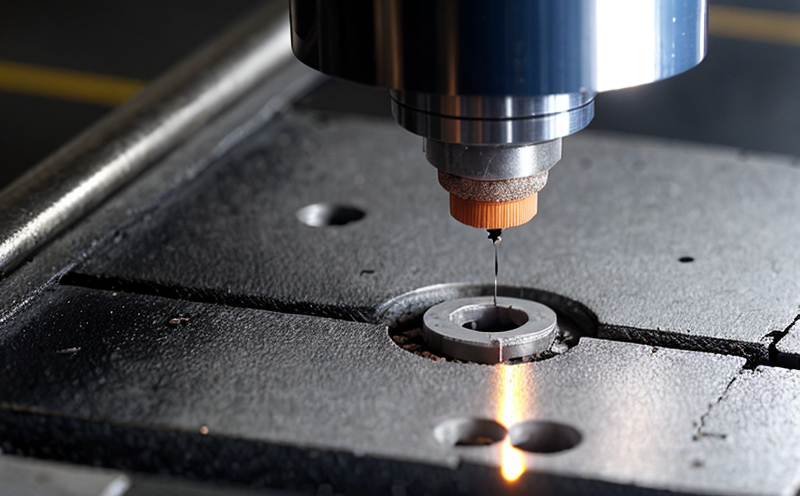ASTM F1398 Ultra-Thin Device Failure Testing
The ASTM F1398 standard provides a comprehensive approach to failure analysis and defect characterization of ultra-thin semiconductor and microchip devices. This service is crucial for quality managers, compliance officers, R&D engineers, and procurement teams who need to ensure the reliability and performance of their products. Ultra-thin devices, often used in advanced electronics like sensors, memory chips, and power semiconductors, are susceptible to defects that can lead to device failure or reduced performance.
The ASTM F1398 standard addresses these challenges by specifying detailed procedures for conducting ultra-thin device failure testing. The process involves a series of non-destructive tests and destructive analysis methods aimed at identifying the root cause of failures. This ensures that any issues are addressed before they lead to broader problems in production or application.
The first step in this service is thorough specimen preparation, which includes cleaning the ultra-thin device to ensure accurate testing results. Once prepared, the devices undergo a series of tests designed to simulate real-world conditions and identify any defects. These tests can include electrical resistance measurements, thermal cycling, and mechanical stress testing.
For destructive analysis, advanced microscopy techniques such as scanning electron microscopy (SEM) and transmission electron microscopy (TEM) are used. These methods allow for high-resolution imaging of the device structure, enabling detailed defect characterization. Additionally, cross-sectional analysis using focused ion beam (FIB) milling is employed to examine internal structures without compromising the integrity of the sample.
The ASTM F1398 standard also emphasizes the importance of reporting and documentation. The results of these tests are meticulously documented, providing a clear record of the testing process and findings. This information is invaluable for quality control and continuous improvement efforts within manufacturing processes.
By adhering to this rigorous testing protocol, manufacturers can ensure that their ultra-thin devices meet stringent quality standards and perform reliably under various operating conditions. The insights gained from this service are crucial for identifying and addressing defects early in the development lifecycle, preventing costly failures later on.
This approach not only enhances product reliability but also supports regulatory compliance with international standards such as ISO 9001 and IEC 62368. It ensures that products meet the highest quality expectations, thereby building customer trust and enhancing brand reputation.
Applied Standards
The ASTM F1398 standard is widely recognized for its comprehensive approach to failure analysis of ultra-thin devices. This service strictly adheres to the guidelines provided by this standard, ensuring that the testing process is both thorough and consistent.
- ASTM F1398-20 Standard Practice: Specifies procedures for conducting non-destructive and destructive tests on ultra-thin semiconductor and microchip devices.
- ISO 9001:2015: Ensures quality management systems are in place, supporting the consistent application of ASTM F1398 practices.
- IEC 62368-1: Provides safety requirements for electrical equipment, ensuring that ultra-thin devices meet stringent safety standards during testing.
The combination of these international standards ensures a robust and reliable testing process. Compliance with these standards not only enhances the quality of the service but also supports broader industry goals related to safety and reliability.
International Acceptance and Recognition
The ASTM F1398 standard has gained widespread acceptance across various industries, making it a cornerstone for failure analysis in semiconductor and microchip testing. Its recognition extends beyond national boundaries, ensuring that the results of this service are universally valid.
Many leading semiconductor manufacturers have implemented ASTM F1398 practices as part of their quality assurance programs. This standard is particularly valued by organizations involved in advanced electronics research and development. The detailed procedures outlined in ASTM F1398 provide a standardized approach to testing, which is critical for maintaining high-quality standards across international markets.
The service provided aligns with the global recognition of ASTM F1398, ensuring that clients receive consistent results regardless of their location or industry segment. This uniformity is crucial in today's interconnected marketplace where seamless communication and collaboration are essential.
Use Cases and Application Examples
The ASTM F1398 Ultra-Thin Device Failure Testing service has a wide range of applications, particularly in the semiconductor and microchip industries. Below are several use cases that highlight how this testing can be applied to different scenarios:
- Quality Assurance: Ensuring that ultra-thin devices meet strict quality standards before they reach the market.
- R&D Innovation: Identifying defects early in the development process, allowing for rapid innovation and improvement.
- Failure Analysis: Determining the root cause of device failures to prevent recurrence and improve product reliability.
- Compliance Auditing: Verifying compliance with international standards to ensure regulatory requirements are met.
- Prediction Modeling: Using test data to predict future performance and potential issues, enabling proactive maintenance strategies.
In addition to these use cases, the service can also be applied in procurement processes. By ensuring that suppliers adhere to ASTM F1398 standards, organizations can maintain consistent quality across their supply chains.
A specific example of this is a leading semiconductor manufacturer who uses ASTM F1398 testing as part of its internal quality control process. The company has seen significant improvements in product reliability and customer satisfaction since implementing these tests.





